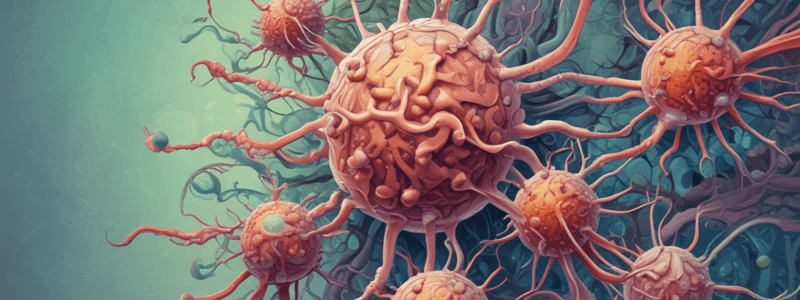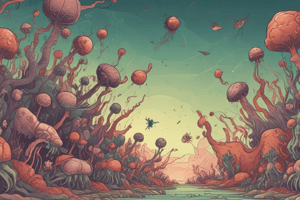Podcast
Questions and Answers
What is the characteristic shape of the nucleocapsid of the Rhabdovirus?
What is the characteristic shape of the nucleocapsid of the Rhabdovirus?
- Bullet-shaped
- Spherical
- Icosahedral
- Helical (correct)
Which of the following is a common reservoir of the Rhabdovirus?
Which of the following is a common reservoir of the Rhabdovirus?
- Cats
- Rats
- Bats (correct)
- Dogs
What is the mechanism of the Rhabdovirus's binding to the neuromuscular junction?
What is the mechanism of the Rhabdovirus's binding to the neuromuscular junction?
- Glycoprotein binds to serotonin receptors
- Glycoprotein binds to nicotinic acetylcholine receptors (correct)
- Glycoprotein binds to GABA receptors
- Glycoprotein binds to dopamine receptors
What is the characteristic of the Rhabdovirus's movement in the neuron?
What is the characteristic of the Rhabdovirus's movement in the neuron?
What is the primary site of replication of the Rhabdovirus?
What is the primary site of replication of the Rhabdovirus?
What is the characteristic of the Negri bodies?
What is the characteristic of the Negri bodies?
What is the primary method of diagnosis for the Rhabdovirus?
What is the primary method of diagnosis for the Rhabdovirus?
What is the primary site of infection of the Rhabdovirus?
What is the primary site of infection of the Rhabdovirus?
What is the treatment for the Rhabdovirus?
What is the treatment for the Rhabdovirus?
What is the characteristic of the cells infected by the Rhabdovirus in the hippocampus?
What is the characteristic of the cells infected by the Rhabdovirus in the hippocampus?
Flashcards are hidden until you start studying
Study Notes
Rhabdovirus (Rabies)
- Rhabdovirus is a negative sense RNA virus with a helical nucleocapsid and a bullet-shaped capsule.
- It is an enveloped virus that can be transmitted through the saliva of infected animals such as bats, foxes, and squirrels.
Mechanism of Infection
- The virus binds to nicotinic acetylcholine receptors in the neuromuscular junction (NMJ) using its glycoprotein.
- Initial infection occurs at the synaptic receptors in the motor end plate.
- The virus replicates in motor neurons and moves in a retrograde fashion to the central nervous system (CNS).
Pathogenesis
- The virus replicates in the dorsal root ganglia and ascends in the spinal cord, eventually spreading to the brain.
- The virus can remain in ACH receptors for days to months before symptoms appear.
Stages of Disease
- Incubation: Asymptomatic, low titer, with virus in muscle.
- Prodrome: Fever, nausea, vomiting, headache, low titer, virus in CNS/brain.
- Neurologic: Hydrophobia, hallucination, delirium, paralysis, antibodies found in serum and CSF.
- Coma/Death: Coma, hypotension, hypoventilation, cardiac arrest (14 days after symptoms).
Diagnosis and Treatment
- Diagnosis is clinical and can be confirmed with Negri bodies, eosinophilic cytoplasmic inclusions found in the hippocampus or cerebellum.
- Treatment involves passive preformed antibodies (IgG) prior to symptoms, and a killed vaccine can be given as a post-exposure prophylaxis.
- Antidote involves administering antibodies prior to symptoms, and killed vaccine can be given even if symptoms have not yet appeared.
Negri Bodies
- Negri bodies are eosinophilic cytoplasmic inclusions found in the hippocampus or cerebellum.
- They are characteristic of rabies infection and can be found in pyramidal cells of the hippocampus and Purkinje cells of the cerebellum.
Studying That Suits You
Use AI to generate personalized quizzes and flashcards to suit your learning preferences.




